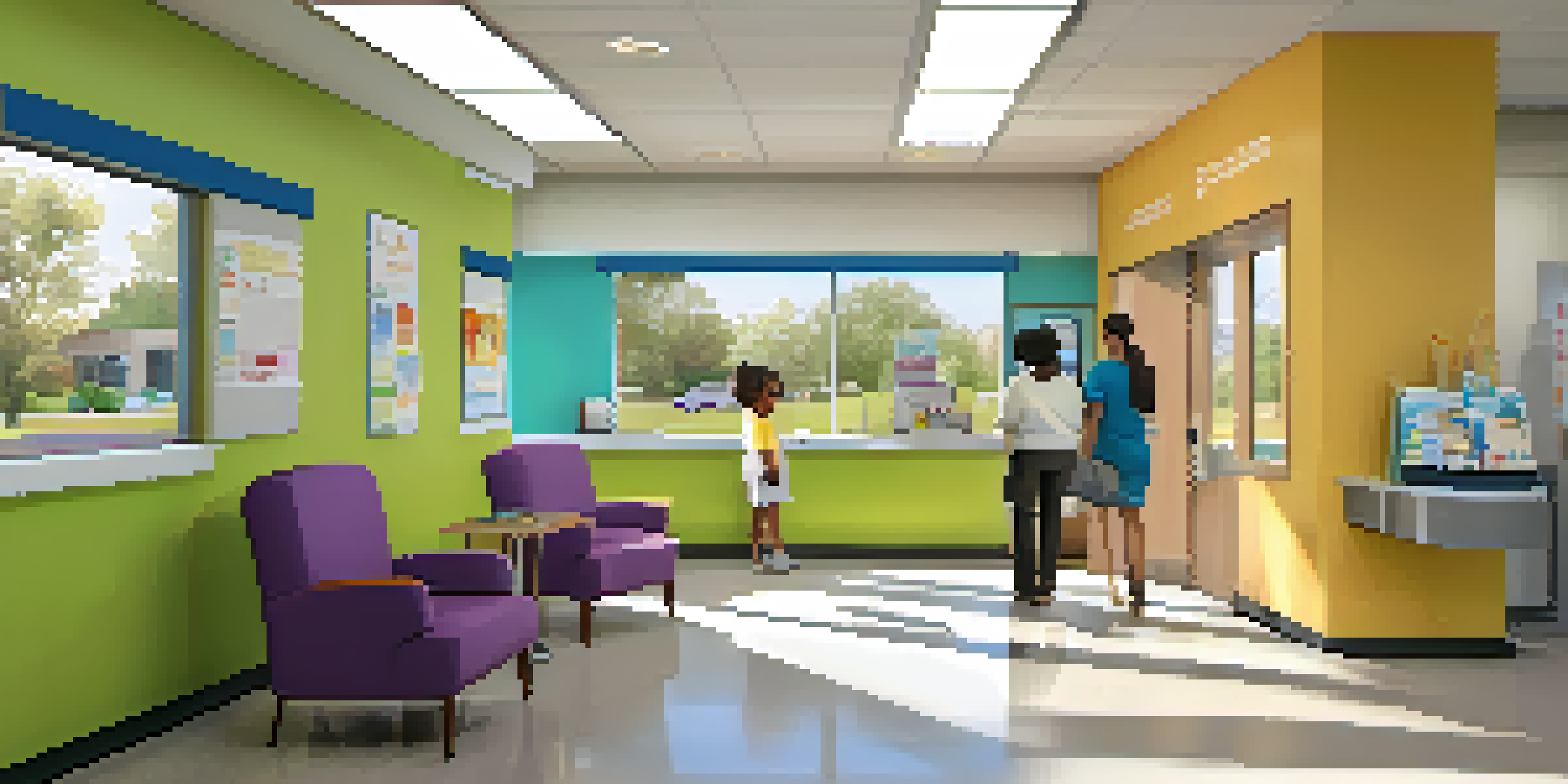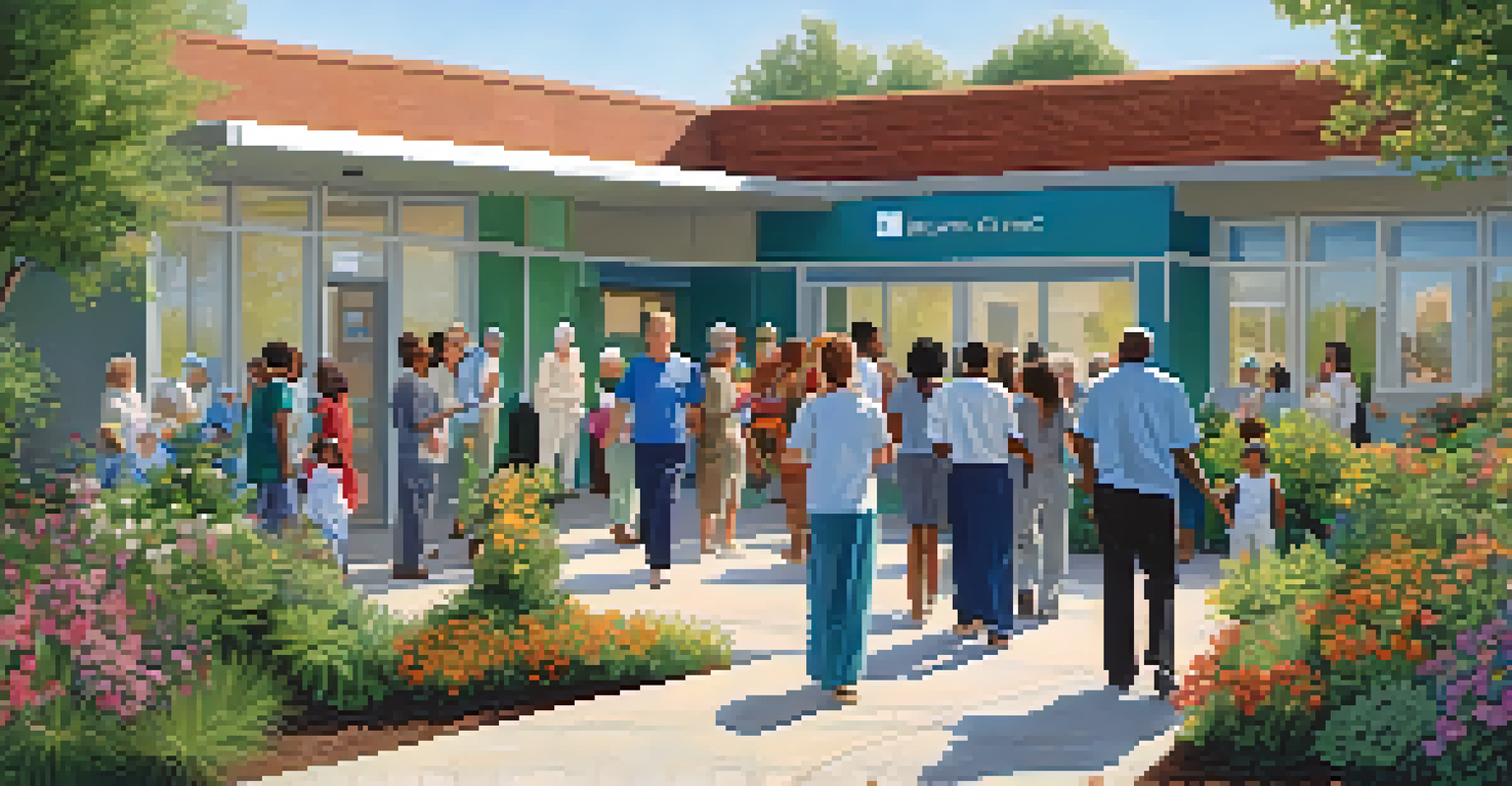Understanding Community Health Clinics and Their Impact

What Are Community Health Clinics?
Community health clinics are local healthcare facilities that provide a variety of services to underserved populations. They focus on offering care regardless of a person's ability to pay, which makes them essential in bridging gaps in the healthcare system. These clinics often offer services like primary care, dental care, and mental health support, all under one roof, ensuring a holistic approach to health.
Health is a state of complete physical, mental, and social well-being and not merely the absence of disease or infirmity.
Think of community health clinics as your neighborhood's health hub, where everyone is welcomed. They are typically staffed by a dedicated team of healthcare professionals, including doctors, nurses, and social workers, who work together to meet the diverse needs of the community. This team-oriented approach ensures that patients receive comprehensive care tailored to their unique situations.
By understanding what community health clinics are, we can better appreciate their vital role in public health. They not only serve as a safety net for low-income individuals but also promote preventive care, which helps reduce the burden on hospitals and emergency rooms. This shift towards community-focused care is crucial for improving overall health outcomes.
The Services Offered by Community Health Clinics
One of the standout features of community health clinics is the wide array of services they provide. From routine check-ups and immunizations to chronic disease management and mental health counseling, these clinics cater to various health needs. They may also offer additional services like nutrition counseling and substance abuse programs, making them a one-stop shop for healthcare.

For example, imagine a single mother who struggles to find time for her family's health needs. A community health clinic can provide her children with vaccinations and dental check-ups while also offering her support for managing stress and anxiety. This comprehensive approach helps families stay healthy and connected to vital resources.
Community Clinics Enhance Health Access
Community health clinics provide essential healthcare services to underserved populations, ensuring accessibility regardless of income.
Such a diverse range of services not only addresses immediate health concerns but also fosters long-term wellness. By providing preventive care and education, community health clinics empower individuals to take charge of their health, ultimately leading to healthier communities.
Why Community Health Clinics Matter
Community health clinics play a crucial role in promoting health equity by serving populations that may otherwise face barriers to care. This includes low-income families, homeless individuals, and those without health insurance. By providing affordable and accessible healthcare, these clinics help ensure that everyone has the opportunity to receive the care they need.
The greatest weapon against stress is our ability to choose one thought over another.
In many cases, community health clinics can be a patient's first point of contact with the healthcare system, making them essential for preventive care. By addressing health issues early, these clinics can help reduce the risk of more severe health problems down the line, leading to better outcomes for individuals and communities alike.
Moreover, community health clinics contribute to the overall well-being of society. By reducing health disparities, they help create healthier communities that are more productive and resilient. This ripple effect benefits everyone, as healthier populations often result in lower healthcare costs and improved quality of life.
The Impact of Community Health Clinics on Public Health
The influence of community health clinics extends beyond individual patients; they also play a significant role in public health. By providing preventive services like screenings and vaccinations, clinics help curb the spread of infectious diseases and promote overall community health. This proactive approach is particularly important in underserved areas where access to healthcare may be limited.
For instance, during outbreaks of diseases like the flu or COVID-19, community health clinics can offer critical services such as testing and vaccination. By making these services easily accessible, they can help contain outbreaks and protect vulnerable populations. This not only benefits individuals but also strengthens the healthcare system as a whole.
Diverse Services for Holistic Care
These clinics offer a wide range of services, from primary care to mental health support, promoting overall wellness in the community.
Ultimately, the impact of community health clinics on public health cannot be overstated. They serve as vital components in creating healthier communities, promoting preventive care, and ensuring that everyone has access to necessary services, regardless of socioeconomic status.
Challenges Faced by Community Health Clinics
Despite their vital role, community health clinics face numerous challenges that can hinder their ability to serve effectively. Funding is often a significant concern, as many clinics rely on government grants and donations to operate. Without consistent financial support, these clinics may struggle to maintain their services and staff, which can directly impact patient care.
Additionally, community health clinics may encounter difficulties in reaching marginalized populations. Factors such as language barriers, transportation issues, and lack of awareness about available services can prevent individuals from seeking care. Addressing these challenges requires innovative outreach strategies and community engagement efforts to build trust and awareness.
Recognizing these challenges is key to finding solutions that can enhance the effectiveness of community health clinics. By advocating for better funding, resources, and outreach efforts, we can help ensure that these essential facilities continue to thrive and meet the needs of their communities.
The Role of Technology in Community Health Clinics
Technology is playing an increasingly important role in enhancing the services offered by community health clinics. Innovations like electronic health records (EHR) streamline patient information management, making it easier for healthcare providers to access and share important data. This leads to more coordinated care and can improve patient outcomes significantly.
Telehealth services have also gained traction, especially during the COVID-19 pandemic. Community health clinics have adapted to offer virtual consultations, allowing patients to receive care from the comfort of their homes. This flexibility is especially beneficial for those with transportation challenges or mobility issues, ensuring they can still access necessary health services.
Technology Boosts Clinic Efficiency
Innovative technologies like telehealth and electronic health records improve service delivery and patient engagement in community health clinics.
Moreover, technology can aid in patient education and engagement. Online resources, mobile apps, and automated appointment reminders help keep patients informed and involved in their health journey. By leveraging technology, community health clinics can enhance their service delivery and foster a more connected healthcare experience.
How You Can Support Community Health Clinics
Supporting community health clinics is essential for maintaining their vital services. One of the simplest ways to help is through donations, whether financial or in-kind contributions. Many clinics welcome supplies, volunteer time, or even partnerships with local businesses to enhance their offerings and reach more people.
Additionally, spreading awareness about the services provided by community health clinics can make a significant difference. By sharing information with friends, family, and social networks, you can help those in need learn about the resources available to them. Every person who accesses care can lead to healthier individuals and stronger communities.

Finally, advocating for policies that support funding and resources for community health clinics is crucial. Engaging with local representatives and voicing the importance of these clinics can help ensure they receive the attention and support they deserve. Together, we can contribute to a healthier future for all.